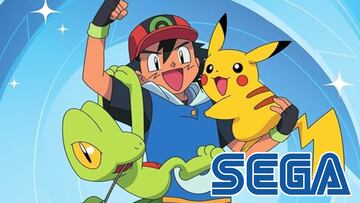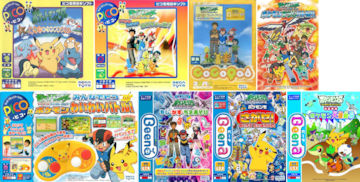Pokémon
The Pokémon franchise is not exclusive to Nintendo, and these Sega games prove it
Learn about the history of Pokémon games on Sega Pico and Advanced Pico Beena, SEGA’s educational consoles.

When we talk about the Pokémon series, everyone associates it with Nintendo, and rightly so. Nintendo is one-third owner of The Pokémon Company, a business conglomerate made up of the Big N, Creatures, and Game Freak that was created to better manage the brand and its products. What many people don’t know is that several Pokémon games have been released on Sega consoles. Specifically, CoCoPad, Sega Pico and its successor, Advanced Pico Beena.
Pokémon on a Sega console? Yes, it has happened, and its existence implies that the saga is not exclusive to Nintendo.
As we can see on Bulbapedia, a total of eight Pokémon games were released on Sega consoles between 2002 and 2010, all of them exclusive to Japan. The list of titles is below:

- Pocket Monsters: Catch the Numbers! (Sega Pico, 2002)
- Pocket Monsters Advanced Generation: I’ve Begun Hiragana and Katakana! (Sega Pico, 2003)
- Pocket Monsters Advanced Generation: Pico for Everyone - Pokémon Loud Battle! (Sega Pico, 2004)
- Pocket Monsters Advanced Generation: Pokémon Super Drill Let’s Learn Numbers from 1 to 20!! (CoCoPad, 2005)
- Pocket Monsters Advanced Generation: Pokémon Number Battle!! (Advanced Pico Beena, 2005)
- Intellectual Training Drill - Pocket Monsters Diamond & Pearl: Letter and Number Intelligence Game (Advanced Pico Beena, 2007)
- Pocket Monsters Diamond & Pearl: Search for Pokémon! Adventure in the Maze! (Advanced Pico Beena, 2009)
- Pocket Monsters Best Wishes: Intelligence Training - Pokémon Big Sports Meet! (Advanced Pico Beena, 2010)
All of these games were released for Sega consoles: Sega Pico, CoCoPad, and Advanced Pico Beena. However, these systems are not normal consoles, nor are these Pokémon games “normal” titles like the first-generation games: Blue, Red and Yellow. There were no battles or captures here; we are talking about consoles and educational video games.

The existence of these titles on these systems proves that, strictly speaking, the Pokémon franchise is not exclusive to Nintendo consoles.
Below is a gameplay video of Pocket Monsters Advanced Generation: I’ve Begun Hiragana and Katakana! As the name suggests, this is an educational game to practice and learn calligraphy in Hiragana and Katakana. The game includes short scenes with animation and voice between the exercises to make it more enjoyable.
Sega Pico, Advanced Pico Beena and CoCoPad, Sega’s educational consoles, were as follows
Sega Pico was an educational console released in Japan in June 1993 and in the United States and Europe in 1994. It was not an ordinary console, but an educational system designed to educate and entertain children. Although this game system was released worldwide, it was not very successful in the United States and Europe and was discontinued in early 1998. An estimated 3,400,000 units were sold in Japan and 400,000 in the United States.
The Advanced Pico Beena was the successor to the Sega Pico, which was released in 2005 exclusively in Japan and also focused on educational games. Its life cycle was about six years and Sega itself estimated in 2010 that they had sold 4,100,000 units and 20 million cartridges/games for this system.
On the other hand, CoCoPad was an educational handheld console released in 2002 exclusively in Japan. Its hardware is based on that of LeapFrog’s LeapPad, released in 1999. The similarities in the hardware of both machines allow some LeapPad games to be played on the CoCoPad and vice versa.


